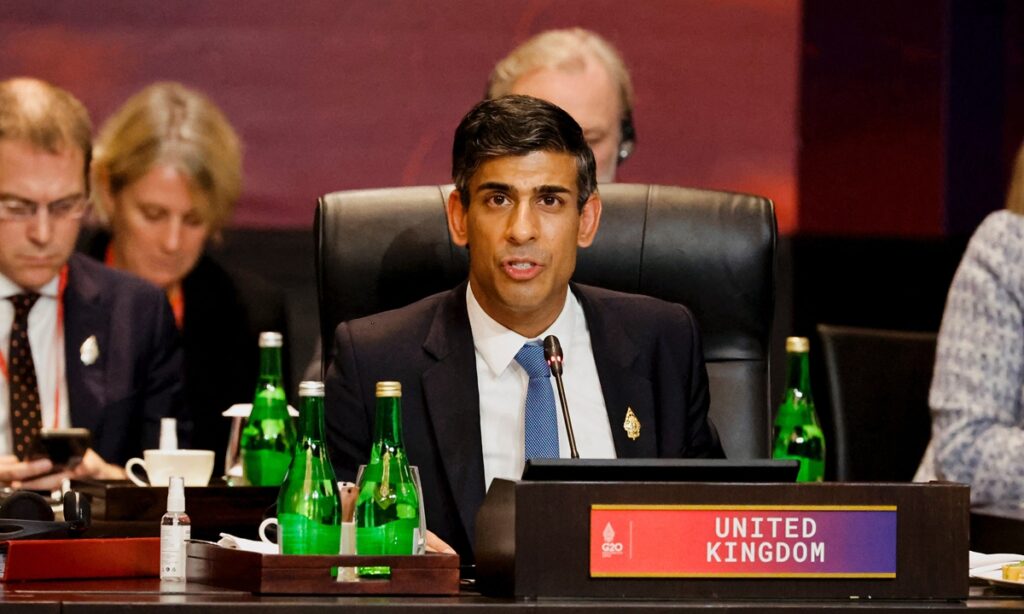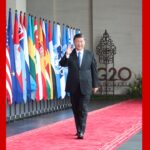A multilateral event like the G20 summit would have been perfect for enhancing communication between countries. Still, it looked like the UK has killed the possibility of having a dialogue with China. As long as London doesn’t stop its provocative behaviors on issues involving Beijing’s bottom line, there is no hope for improving bilateral relations.
According to Reuters, a meeting between Chinese President Xi Jinping and British Prime Minister Rishi Sunak, scheduled for Wednesday, was canceled due to “scheduling issues,” as the British side claimed. However, Chinese experts believe that it is possible that the cancellation is a way for China to express its strong dissatisfaction with Britain’s recent provocations on the Taiwan question.
This includes the fact that Sunak doesn’t rule out the possibility of sending arms to the island of Taiwan. Also, last week, Britain’s Minister of State for Trade Policy Greg Hands paid a visit to the island, which China’s Foreign Affairs Ministry firmly opposed.
When asked about Hands’ trip, Ma Xiaoguang, spokesperson of the Taiwan Affairs Office under the State Council, on Wednesday urged the UK to adhere to the one-China principle and stop sending wrong signals to Taiwan secessionist forces.
China doesn’t want a hostile relationship with any country from the West, including the UK. But If these nations want to maintain their communication with China, they should know that the prerequisite is that they should never tread on China’s red line issue – the Taiwan question.
On Wednesday, Chinese Foreign Ministry spokesperson Mao Ning stressed her hope that the UK will “meet China halfway” in response to a question about the cancellation of the Xi-Sunak meeting. London should really ponder the message behind such a statement, as should all other countries and forces attempting to play the “Taiwan card” to threaten China’s sovereignty.
Despite making provocative moves, the UK tried to offset them by using words that it thought were less irritating to China. Sunak on Tuesday referred to China as a “systemic challenge,” a tone-down from the “threat” status he gave China during his election campaign.
Some politicians from the Conservative Party viewed such a change of word as an “appeasement” with China. Yet, Sunak has also shown a somewhat contradictory mentality, as he also pointed out that China is the “single biggest state threat” to Britain’s economic security.
According to Gao Jian, the director of the Center for British Studies at Shanghai International Studies University, Britain’s policies on both domestic and foreign affairs lack logic. On the one hand the country’s foreign policy has a strong ideological hue, but on the other hand there is a need for pragmatism in the country. As a result, the policy-making of the British government appears quite torn up, without any consistency.
British politicians tend to view China’s rise with a short-sighted strategic vision and a rigid anti-China mindset to cater to the growing extreme conservatism within the country. And if they do not discard this irrational perception, China-UK relations will face even greater challenges.
“At the end of the day, these politicians are trying to seek attention for themselves. They only care about their interests rather than those of their country. That is why the UK is on decline,” Gao noted.
In fact, apart from the UK, the leaders of Germany, Australia, and even the US have softened their harsh tone against China to some extent when meeting with the Chinese leader. Western politicians have to act realistically. Western countries, including the US and Britain, still need China, especially in solving economic and social problems.
It seems that Sunak’s trick of softening his stance toward China didn’t work. The UK wants the door of enhancing relations with China open, but it should realize that it has long closed such a door with its own actions. This is obviously a fatal blow to Britain, which needs economic and trade relations with China to save itself from the current chaos.
The “Taiwan card” is what the US likes to play. But this game is even more dangerous to the UK. Under the heavy influence of Washington, London is constantly narrowing its diplomatic path to serve US strategic considerations at the cost of China-UK relations. But is it worth it? Or who will this benefit? Britain needs to think about these questions thoroughly before it’s too late.
(Global Times)




